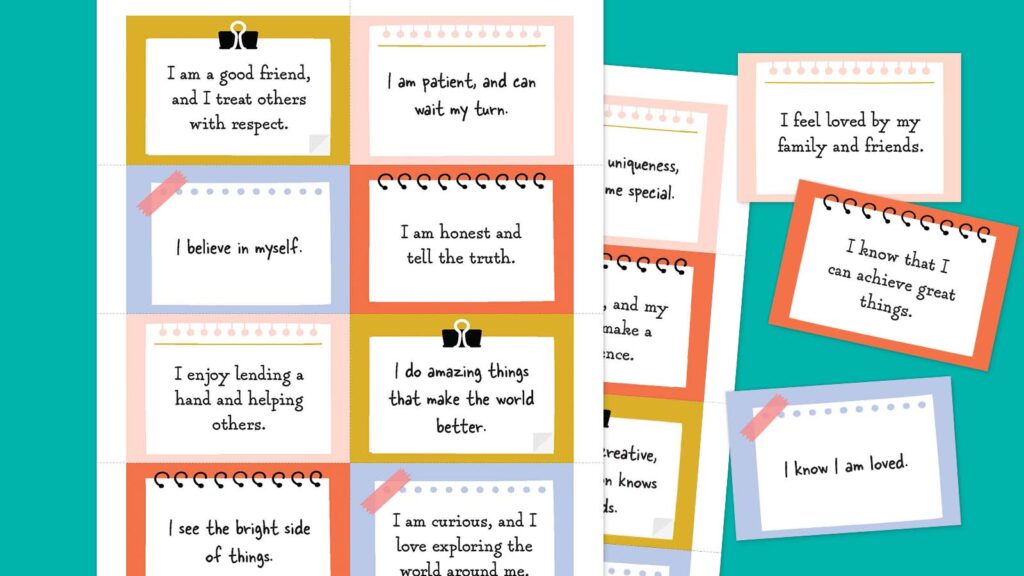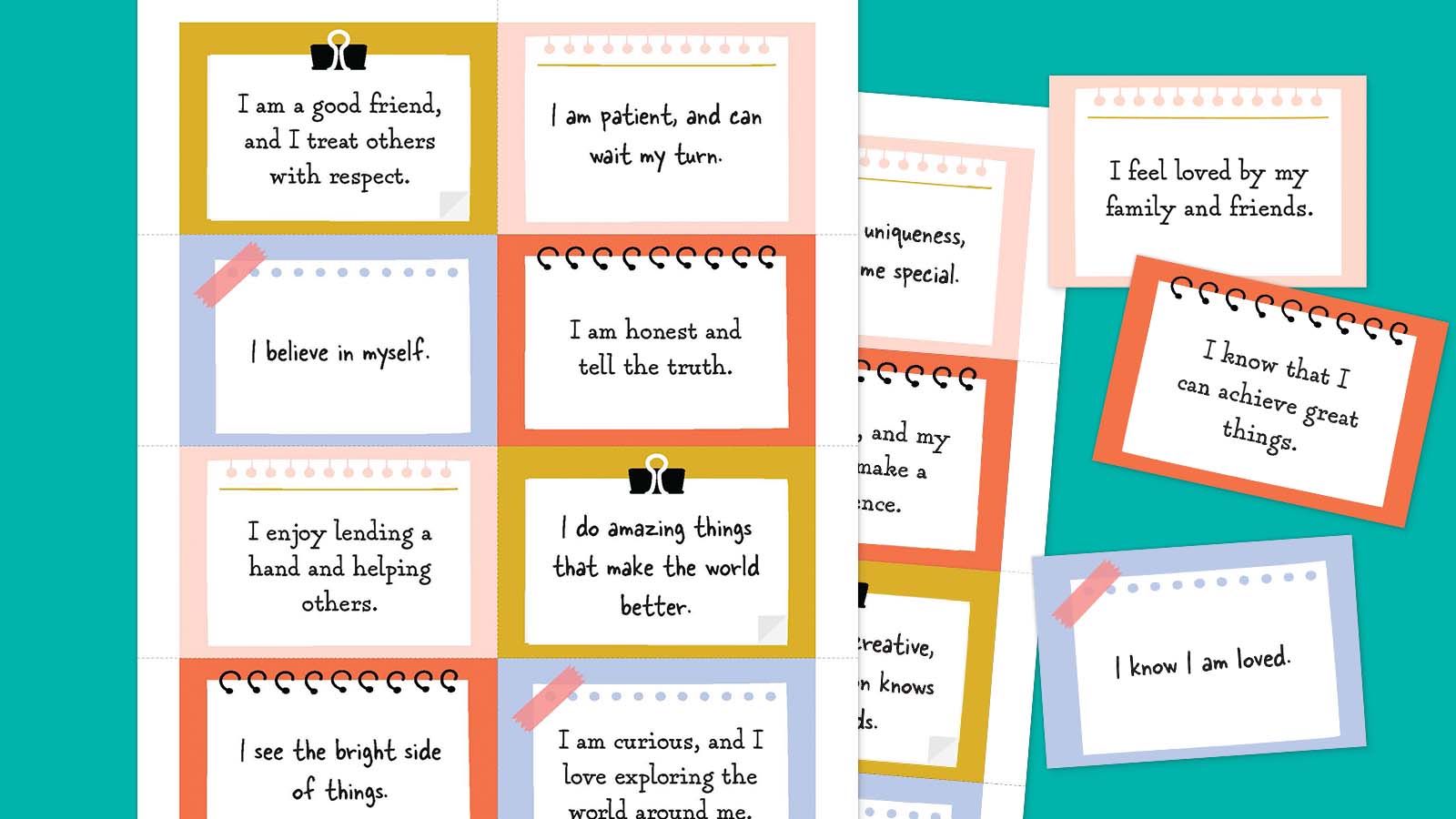
Empowering Young Minds: The Power of Kids Affirmations
In a world that constantly bombards children with messages of inadequacy and self-doubt, the practice of kids affirmations stands as a beacon of hope. These positive statements, repeated regularly, can significantly impact a child’s self-esteem, confidence, and overall well-being. But what exactly are kids affirmations, and how can parents and educators effectively integrate them into a child’s daily life?
This article delves into the science-backed benefits of kids affirmations, providing practical guidance on creating and using them to foster a positive self-image in children. We’ll explore various examples, age-appropriate approaches, and address common concerns, ensuring you have the tools to empower the young minds in your life.
Understanding the Science Behind Affirmations
The effectiveness of affirmations isn’t just anecdotal; it’s rooted in neuroscience. Studies have shown that regularly practicing affirmations can actually rewire the brain. When we repeat positive statements, we activate neural pathways associated with positive emotions and self-belief. Over time, these pathways become stronger, making positive thoughts and feelings more accessible and automatic. This process, known as neuroplasticity, allows the brain to adapt and change in response to repeated experiences.
Specifically, affirmations can increase activity in the ventromedial prefrontal cortex, a brain region involved in self-referential processing and positive valuation. This means that when children engage in kids affirmations, they are literally training their brains to view themselves more positively. [See also: Boosting Children’s Confidence]
The Benefits of Kids Affirmations: More Than Just Positive Thinking
The advantages of incorporating kids affirmations into a child’s routine extend far beyond simply feeling good. They can have a profound impact on various aspects of a child’s development:
- Improved Self-Esteem: Regularly repeating positive statements about their worth and abilities helps children develop a stronger sense of self-esteem.
- Increased Confidence: Kids affirmations can help children believe in their potential and take on new challenges with greater confidence.
- Reduced Anxiety and Stress: Focusing on positive thoughts can help children manage anxiety and stress by shifting their attention away from negative worries.
- Enhanced Resilience: By building a foundation of positive self-belief, kids affirmations help children bounce back from setbacks and challenges more effectively.
- Improved Academic Performance: When children believe in their ability to learn and succeed, they are more likely to put in the effort required to achieve their academic goals.
- Better Social Skills: Children with high self-esteem and confidence tend to have better social skills and relationships.
- Positive Mindset: Kids affirmations cultivate a positive mindset, helping children approach life with optimism and enthusiasm.
Crafting Effective Kids Affirmations: A Step-by-Step Guide
Creating effective kids affirmations requires careful consideration of a child’s specific needs and challenges. Here’s a step-by-step guide to help you craft affirmations that resonate with your child:
- Identify the Challenge: Start by identifying the specific area where your child is struggling. Are they lacking confidence in their academic abilities? Are they struggling with social anxiety?
- Focus on the Positive: Frame the affirmation in a positive light, focusing on what you want to achieve rather than what you want to avoid. For example, instead of saying “I am not afraid to speak in class,” say “I am confident and comfortable speaking in class.”
- Use “I Am” Statements: Begin each affirmation with “I am” to reinforce the idea that the statement is a reflection of their true self.
- Keep it Simple and Concise: Use language that is easy for your child to understand and remember. Short, punchy affirmations are more effective than long, complex ones.
- Make it Specific: Vague affirmations are less effective than specific ones. Tailor the affirmation to the specific challenge your child is facing.
- Use Emotionally Charged Words: Incorporate words that evoke positive emotions, such as “strong,” “brave,” “capable,” and “loved.”
- Make it Believable: The affirmation should be realistic and believable for your child. If they don’t believe the affirmation, it won’t be effective.
- Involve Your Child: The most effective kids affirmations are those that are created in collaboration with the child. Ask them what positive qualities they would like to develop and incorporate their ideas into the affirmations.
Examples of Kids Affirmations for Different Situations
Here are some examples of kids affirmations that can be used in different situations:
For Self-Esteem:
- I am a valuable and important person.
- I love and accept myself unconditionally.
- I am proud of who I am.
- I am worthy of love and happiness.
- I am unique and special.
For Confidence:
- I am confident and capable.
- I believe in my abilities.
- I can achieve anything I set my mind to.
- I am brave and courageous.
- I am not afraid to try new things.
For Academic Success:
- I am a good student.
- I am smart and capable of learning.
- I enjoy learning new things.
- I am focused and attentive in class.
- I am confident in my ability to succeed in school.
For Social Skills:
- I am friendly and kind to others.
- I am a good listener.
- I am able to make friends easily.
- I am respectful of others.
- I am confident in social situations.
For Managing Anxiety:
- I am calm and relaxed.
- I am safe and secure.
- I am in control of my emotions.
- I can handle any situation that comes my way.
- I am strong and resilient.
Integrating Kids Affirmations into Daily Life: Practical Tips
The key to success with kids affirmations is consistency. Here are some practical tips for integrating them into your child’s daily life:
- Make it a Routine: Incorporate affirmations into your child’s daily routine, such as during breakfast, before bedtime, or on the way to school.
- Use Visual Reminders: Post affirmations in visible locations, such as on the bathroom mirror, on the refrigerator, or in their bedroom.
- Say Them Together: Make it a family activity to say affirmations together. This can create a positive and supportive environment.
- Use Affirmation Cards: Create affirmation cards with positive statements written on them. Have your child choose a card each day and focus on that affirmation throughout the day.
- Use Affirmation Journals: Encourage your child to write down their affirmations in a journal. This can help them internalize the positive messages.
- Be a Role Model: Practice affirmations yourself. Children are more likely to adopt affirmations if they see their parents or caregivers using them.
- Celebrate Successes: Acknowledge and celebrate your child’s successes, no matter how small. This will reinforce the positive messages of the affirmations.
Addressing Common Concerns About Kids Affirmations
Some parents may be skeptical about the effectiveness of kids affirmations. Here are some common concerns and how to address them:
- “It Feels Fake”: It’s normal for affirmations to feel a bit awkward or unnatural at first. Encourage your child to focus on the intention behind the affirmation and to repeat it with sincerity. Over time, it will become more natural.
- “It’s Just Wishful Thinking”: Affirmations are not a magic bullet. They are a tool to help children develop a more positive mindset and believe in their potential. They need to be combined with action and effort to achieve real results.
- “It’s Too Woo-Woo”: Affirmations are based on scientific principles of neuroplasticity and cognitive psychology. They are not a mystical or New Age practice.
- “It’s Not Age-Appropriate”: Affirmations can be adapted to suit children of all ages. The key is to use language that is easy for them to understand and to focus on topics that are relevant to their lives.
The Long-Term Impact of Kids Affirmations
The benefits of kids affirmations extend far beyond childhood. By instilling a positive self-image and a belief in their abilities, affirmations can help children develop into confident, resilient, and successful adults. They learn to approach challenges with optimism, manage stress effectively, and build strong relationships.
Moreover, the habit of positive self-talk learned through kids affirmations can serve as a valuable coping mechanism throughout life. When faced with adversity, individuals who have practiced affirmations are more likely to draw upon their inner strength and resilience to overcome obstacles.
Conclusion: Investing in Your Child’s Future with Positive Affirmations
Kids affirmations are a powerful tool for empowering young minds and fostering a positive self-image. By incorporating affirmations into your child’s daily life, you can help them develop the confidence, resilience, and self-esteem they need to thrive. It’s an investment in their future that will pay dividends for years to come. Start today and witness the transformative power of positive self-talk in your child’s life. Remember to tailor the affirmations to your child’s specific needs and challenges, and to make it a fun and engaging activity. With consistency and a positive attitude, you can help your child unlock their full potential and live a happy, fulfilling life. [See also: Building Resilience in Children]

